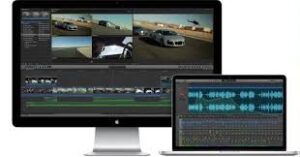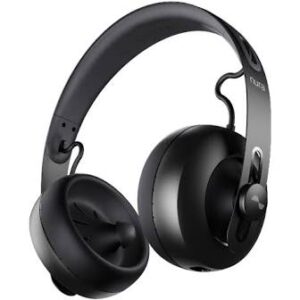You have filmed a video that needs that extra jazz. Now it’s time for the editing stage to make that video as you’ve imagined…. but where do you start?
1. Fast Computer

A computer is essential with decent editing software.
You can pick whatever computer brand or model you want, as long as It is cooperative with your work BUT, the five most important features to look for in a video-editing computer are a CPU processor power, hard drive storage, graphics card, RAM memory, and an LCD monitor.
CPU’s
CPU’s are significant to make the editing software run at maximum speed. CPU’s help the titling, transitions, color correction, and other video effects to render at an efficient rate in your final steps of exporting your video.
If one does not have a CPU, lagging might be at an extreme and/or the exporting process will be extremely slow.
Hard Drive Storage

Storage is important when It comes to importing high definition footage. The recommended amount for an internal hard drive for video editors is 2 TB.
An external hard drive would be a great purchase as you most likely will fill up the storage on your computer pretty quickly with long durations of footage. 1- 2 TB external hard drive would not hurt, especially because you are most likely going to need It.
Graphics Card

The graphics card in your computer will respond by making your video-editing software have a higher performance that fits your needs. This will render a high-resolution image to the monitor when editing your footage.
For an entry-level video editing GPU, GTX 1050 or GTX 1050 Ti is recommended. At 4K or higher resolution, GTX 1660 is a good choice. If you want to go even farther, you will see more improvements from an RTX 2070.
RAM memory
Video-editing seems to take up A LOT of RAM memory. The more you have, the faster the job will get done. For video-editing, you will need AT LEAST 4 GB of RAM memory. The more RAM memory, the better!
LCD Monitor

Monitors are NOT a necessity. If you would like one, a 27-inch monitor could be very beneficial for your video-editing process. Most monitors are inexpensive, but with all of the other equipment, It adds up!
These are some questions you might have to ask yourself when It comes to making that big investment.
Does It have enough storage for all of your footage? Will you need an external hard drive? Will your computer lag with specific features? Will the export process take longer than usual?
My advice is getting the recommended graphics card and processor for your editing software and getting a computer that has a quad-core processor installed with a good GTX graphics card.
2. Professional Editing Software
The right software is the first step in starting the video-editing process.

I started with iMovie just to learn the basic edits like audio, cutting, and transitions. There’s only so much someone can do with iMovie other than the basics and standard video edits, so I decided to switch programs and go with Adobe Premiere Pro.
Adobe Premiere Pro has more features, visibility, like color correction, stabilization, synchronizing audio, etc. Many professionals either use Adobe Premiere Pro, Final Cut Pro, After Effects, etc.
The key to picking the right software is choosing which one best suits your editing style and best works for you. If you have a PC or windows computer, Camtasia and Adobe Premiere will be your best bet.
For mac users, Final Cut Pro and Adobe Premiere are good.
Adobe Premiere is used for professional formats and many video-editors use this program. It lets you move through projects faster and deliver your best work, but again, whatever works best for you!
3. Peripherals
External Hard Drive

As stated above, “an external hard drive would be a great purchase as you most likely will fill up the storage on your computer pretty quickly with long durations of footage.”
I would say it is a necessity to ALWAYS have a backup external hard drive, (recommended 1 TB). You will be able to back up your computer to the hard drive in case It crashes and store all external files that are too big for the computer to store in internal storage.
1- 2 TB external hard drive would not hurt, especially because you are most likely going to need it.
Headphones

A nice pair of headphones will also be beneficial to hear audio tracks that are sometimes attached or not attached to the footage, but you don’t need anything crazy. Apple, JBL, or Beats headphones will do just fine, as long as you can hear the clarity of the audio to reduce any background noise.
External Computer mouse

An external computer mouse is a tool that will help to do edits faster, comfortably, and efficiently.
BUT, It is not a necessity.
Mice are usually designed for video gamers, a mouse will be another wire beside your dash that you don’t need. The mouse that your computer provides is good enough!
4. Workflow
With these essentials, it’s important that you maintain an efficient workflow.
Organize
Organize your projects and files in folders that you will remember to go back to. Title folders like b-roll, documentary, action footage, etc. so you won’t be confused where footage is located for a specific project.
Utilize keyboard shortcuts

These will also help video-editing go a little faster by speeding up the process.
When I first started, I had a notebook of keyboard short-cuts to memorize and make sure I’m doing the right shortcuts.
Once you do it over and over again, It will be a lot easier to memorize and will expedite the tool usage in your editing software. These might vary from software to software.
Schedule
Schedule a time 5 days out of the week to improve your skills that you learned on the editing software from research or just in general. This will help you become an efficient and faster video-editor!
If you are serious about trying to become a professional video editor, It takes time! Put in the work and It will reward you.
5. Incorporate your editing style
In the end, everyone has their own editing style. Video editing is a type of art. Whether it’s documentary style, live-action, montage, etc. Find your specific passion and go with It!
Identify your editing style by seeing what you’re drawn to the most.
What videos are you drawn to? What are you trying to corporate through your videos? What goal are you trying to accomplish?
Do research with your editing software and practice! The more you practice, the better your video editing skills will become! Cheers.



